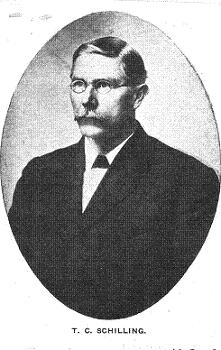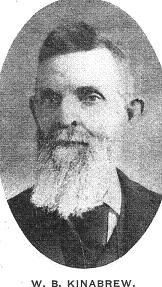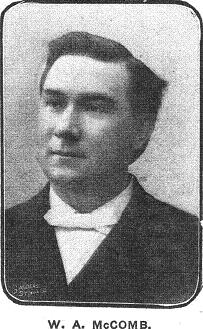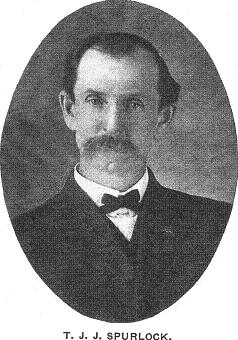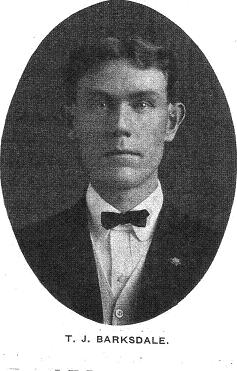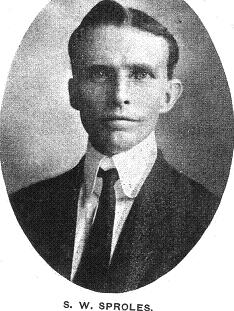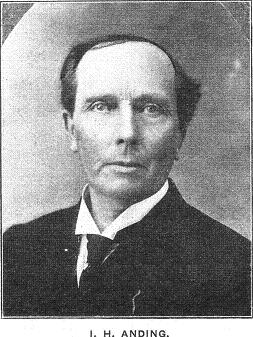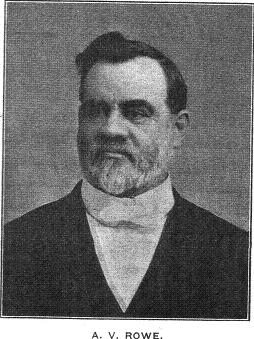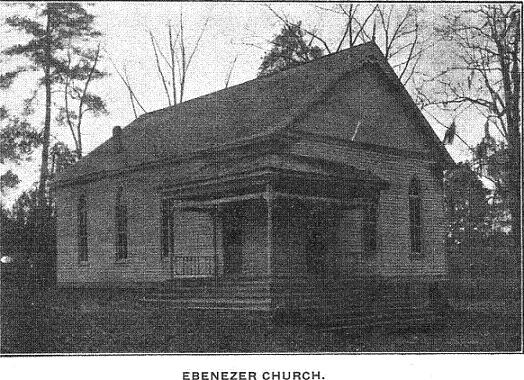Abstract History of the Mississippi Baptist Association
From Its Preliminary Organization in 1806 To The Centennial Session in 1906
By T. C. Schilling, 1908
(Continued)1900 - New Salem was the place of meeting on the 13th of October. Twenty churches were represented, and the Association was organized by electing J. H. Lane moderator, E. Gardner clerk and Willam H. Causey treasurer.
J. P. Culpepper was the preacher of the annual sermon, and a number of addresses were made on the "New Century Movement," as follows: J. J. Walker discussed "The Spread of Baptist Principles in the Last Century," J. H. Lane spoke on the "Distinctive Principles of Baptists," and John P. Culpepper made an address on the "Hope of the Century."
There was preaching during the meeting by J. J. W. Matthis, J. J. Walker and J. H. Lane.
The matter of erecting a monument at the grave of the late Elder Zachariah Reeves was discussed, and a committee of three - viz., C. P. Jones, J. A. Burris and Winchester Everett - was appointed to raise the necessary funds.
J. P. Culpepper presented the report on the "New Century Movement," which closes in this way:
"We are more than 2,000 strong. It is with sadness that we must say that we gave last year eleven cents apiece for missions. We would recommend that a New Century meeting be held in all the churches during the year, and that special efforts be made to enlist all the members of the churches in the salvation of the world. May it be that, before the New Century that is about to be born, has rolled its years away, our blessed Lord will come back to earth to claim His own."The routine business was finished and the body adjourned to meet a year hence with Mars Hill.
[p. 233]
Joel H. Lane was born in Rankin county, Miss., October 9, 1862. He was educated at Mississippi College and the Southern Baptist Theological Seminary. In 1882 he was licensed to preachby the church at Clinton, Miss., and ordained at Salem church, Simpson county, January 30, 1885. He taught school in this county and served Strong River and Hepzibah churches one year. He then located at McComb City, serving as pastor there 
JOEL H. LANE
[p. 234]
and at Magnolia. While in the seminary at Louisville he was pastor one year at Jeffersonville, Ind. Returning to his native State, he was pastor at Osyka and Amite City, La.Mr. Lane's next move was to East Fork, Amite county, where he built a good home and served as pastor of East Fork church for eleven years. He was also bishop at Mars Hill for several years during this time, both these churches having services two Sundays a month. Other churches ministered to in Amite county were Hebron, Liberty, Gillsburg, Mt. Vernon and Tangipahoa. At the latter he led the saints in the work of building an elegant house of worship. He was a zealous leader in founding and maintaining the East Fork high school, an institution which flourished several years. He enjoys the distinction of having baptized five hundred and eighty persons in the river Amite, besides doing much other pastoral work. In 1903 he left the "old Mississippi" and moved to Magnolia, again building a neat home and remaining four years. While here he was pastor of a number of churches in town and country. His next move was to McComb City, his present field. Here he built a commodious homa on "College Hill," and here he ministers to the South McComb Baptist church and others around. His church has grown into a large and influential body, and owns a good house of worship. In addition to his work as a pastor, Mr. Lane has given much time to evangelistic work with good results.
His wife was Miss Julia Dampeer, youngest daughter of Col. J. M. Dampeer, to whom he was married November 30, 1890. They have five children, two sons and three daughters.
Mr. Lane is of genial disposition and ready wit, and makes many friends. He has celebrated as many as three marriages in one day and had an invitation for the fourth, but, there being a limit to his physical endurance, he failed to reach the last. He is a man of faith and prayer, and of good ability.
The picture on the preceding page represents him in his study.
[p. 235]
William H. Causey was born near Liberty, Miss., May 9, 1848, and spent his youth there, except three years. He was away two years in the Southern army, and it was while in camp at Grenada, Miss., in 1864, that he professed faith in Christ and was baptized. He was married December 28, 1871, to Miss Mary J. Rice, daughter of the late Robert T. Rice.Mr. Causey has been a deacon of the Liberty Baptist church some eighteen or twenty years, is regular in attending worship and faithful in the discharge of his duties. He is a grandson of William Causey, the second treasurer of the Association, an account of whose life has already been given. 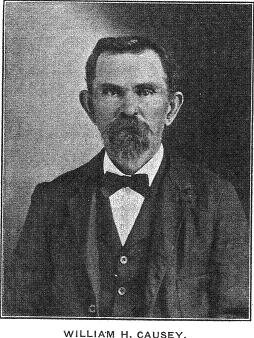
WILLIAM H. CAUSEYHe is a well-to-do farmer and lives near the courthouse town in old Amite. He has reared a family of several children.
[p. 236]
W. K. Anderson was born in Amite county, Miss,, May 11, 1860, growing to manhood and attending school in his native county. In 1880 he united with East Fork church, and in 1891 was ordained to the work of the ministry. He has served a number of churches as pastor, being at present actively engaged in the work. He has been twice married, first to Miss Minnie Burris,on May 8, 1883, and second to Mrs. Alice Causey Newman, August 22, 1907. Mr. Anderson is a conscientious and devout man and a useful preacher. In his pastoral work during these sixteen years he has traveled 11,000 miles, preached 600 sermons, made 1,000 visits and baptized nearly 250 persons. He is a student of the Word and knows how to endure hardness as a good soldier of Jesus Christ. His home is at Glading, Miss. 
W. K. ANDERSON
[p. 237]
J. J. Stringfield was born in Washington parish, La., June 19, 1859, and was reared on the farm, attending the public and private schools of the country. He united with Mt. Pisgah church, near his home, when sixteen years old, and was baptized by the late Elder F. W. Eady. When quite young he felt that it would be his duty to preach, and desired better preparation. Accordingly he entered school at Gillsburg, Miss., in 1888, and on the 9th of March, 1890, was licensed by the Gillsburg church.His ordination occurred at Gloster, Miss., in 1898, the ordaining council being composed of Elders R. J. Stewart, E. T. Smith and M. T. Martin. 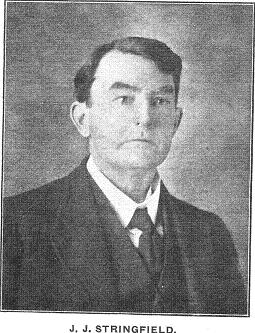
J. J. STRINGFIELDOwing to a serious and protracted affliction from rheumatism, Mr. Stringfield has never been able to enter the work of the ministry as he had hoped, but has spent his time mainly in teaching. He has served one term as assessor of Amite county, and in 1907 was elected county treasurer. His home is at Liberty, Miss.
[p. 238]
1901 - The "old Mississippi," in common with the rest of the world, has now entered the twentieth century, and her own centennial is rapidly approaching. On the 11th of October the tribes gather at Mars Hill to hold the ninety-fifth annual session. T. C. Schilling is elected moderator, E. Gardner clerk, and J. D. Lea treasurer. The annual sermon is delivered by E. Gardner.I. H. Anding and W. R. Walker come from the Bogue Chitto Association; S. J. McBride from the Copiah county Association, and L. D. Scarborough from the Fair River. A. V. Rowe, the indefatigable mission secretary, is present from the Convention Board, ready to speak in behalf of a perishing world.
J. J. Walker, a man full of missionary zeal, submits a good report on missions, which is discussed by him and Secretary Rowe, and a special prayer for the work is led, by T. C. Schilling. It is worthy of remark that the spirit of world-evangelization has been growing with the passing years, until the subject now has the right of way, and no one thinks of opposing the great cause. There have all along been a few earnest souls who talked and worked for missions, while the masses have been indifferent, but now the interest is more general and the zeal greater. There remains, however, much to be done, if we would obey the last command of the risen Savior.
This report says: "Baptists are fast learning that our great business in this world is evangelization. The 'Go' of the commission is as mandatory, and is as much fraught with promise, as is the 'Baptize.' He who neglects either or opposes either fails equally in meeting the conditions of the promise, 'Lo, I am with you all the days.'"
It is also manifest that the temperance sentiment has been growing, along with other questions of progress. For many years strong reports on the evil of intoxicants have been presented and discussed. And while a complete victory over this sin has not been won, there can be no doubt that a gratifying advance has been made. The report this year says: "But as to the use of alcoholic drinks as a beverage, we should be more than temperate - we should abstain altogether from it. We believe it. to be unbecoming a Christian even to take a little. The time was when but little was thought if a Christian took a drink, but that time is past. It is a shame for us to taste the fluid that has brought so much woe to our land and country."
[p. 239]
There was preaching on the Lord's day by T. C. Schilling and J. B. Quin, the former in the church and the latter in the school-house. Collections were taken for Elder S. H. Thompson and the Baptist Orphanage.The committee appointed last year to raise funds to erect a monument at the grave of Zachariah Reeves made the following report:
"We succeeded in raising a fund of $90 from the churches and relatives. We have contracted for the best we could get for that amount. The monument will have a base rock two feet square, and a shaft fourteen inches square, standing six feet ten inches in height. The inscription to contain an open Bible, name, dates of birth and death and ordination to the ministry, and number of years serving as moderator of this Association.The committee also requested the Association to inclose the monument and graves with a substantial fence, and a collection of $20 was taken for this purpose."As his wife and daughter (the only members of his family buried there) are on each side of his grave, the contractor kindly offered to inscribe their names, dates of birth and death, on their respective sides of the monument, without additional cost."
W. B. Kinabrew, chairman of the committee, writes in a forcible way on "Pastoral Support," as follows:
"That it is the duty of the churches to support the pastors will not be disputed. The Scriptures say that those who preach the gospel should live of the gospel. But the question is: What kind of a living should we give our pastors? In estimating the wages of any laborer, several things are to be considered. 1. What talent does it take to enable one to perform the work? 2. What training and expense does it require? And, lastly, what value is the work when accomplished? If we apply these tests to the preachng of the gospel and performing pastoral work, we will find that it takes the best talent to be had, and it requires much training and a considerable expense to qualify one for the work. And this talent, training and expense should command as much as like qualificaions in other callings."The statistical tables show 208 baptisms, 2,692 members and the sum of $6,779.99 contributed.
[p. 240]
The following biography was prepared by Elder W. F. Yarborough, pastor of the First Baptist Church, Jackson, Miss.:No history of the Mississippi Association would be complete without some notice of the life and labors of this faithful servant of God.
T. C. Schilling was born in Washington parish, La., January 23, 1853. He professed religion at seventeen years of age, being baptized into the fellowship of Mt. Hermon church of Louisiana. He received his early education in the neighborhood schools. Prominent among his instructors was Prof. W. H. Dixon, an
T. C. Schilling
[p. 241]
Englishman, and a man of scholarly attainments and fine teaching ability. Later he enjoyed a course of instruction under the lamented M. S. Shirk, of Osyka, one of the ripest scholars of all that section. Some years after his marriage and his ordination to the ministry, he was induced to undertake a course of study in Mississippi College. Accordingly, in the fall of 1880 he moved to Clinton and entered the college, but was forced after a short time, by serious and continued illness in his family, to give up his cherished undertaking and return home, to take up whatever work the Lord might open to him.Though frustrated in his plans for a college education, he had already learned one of the main lessons intended for the college student - that of continuous application to his studies. He has never ceased to be a student, especially of the Book, and has been able to hold his own with many men of better advantages as a master of clear, concise and forceful expression, and as an exponent of Bible doctrines. Service in bis early life as bookkeeper and school teacher proved very helpful as a factor in his preparation for his life work.
He was married February 3, 1876, to Miss Angie D. James, who has proved herself a faithful and devoted wife. Blessings on these faithful and self-sacrificing preachers' wives, who "stay by the stuff," rear the children and bear the burdens, through winter's storms and summer's sun, while their husbands are giving their lives to make the world better and to lift souls to heaven. Truly theirs is the harder lot and theirs ought to he the greater glory, though they are the faithful ones whose toils and tears and sacrifices are unknown to the world.
Bro. Schilling was licensed to preach in 1873, and ordained in 1876, the presbytery being composed of Elders W. J. Fortinberry, C. F. Crawford, W. H. and E. M. Schilling. His ministerial labors have been mainly in Amite and Pike counties, Miss., he having also served a number of churches in Louisiana. In an unexpected and providential way his life became linked with the little village of Gillsburg, Amite county, and eternity alone will reveal the value of his contribution to the religious and educational interests of that community. This inland village came to be known far and near through the Gillsburg Collegiate Institute, founded in 1882 by Mr. W. A. Gill, whose generous giving and unselfish devation to the public good entitle him to rank among the world's benefactors.
[p. 242]
In the fall of 1882 Bro. Schilling was unexpectedly called to the pastorate of Jerusalem Baptist church, two miles distant from Gillsburg. During the following year, while serving this church, he was invited by Mr. Gill to preach on Sunday afternoons of the same year at Gillsburg, for which service Mr. Gill himself paid. So satisfactory was the service rendered that at the beginnng of the next year, January 3, 1884, Bro. Schilling found himself a resident of Gillsburg as pastor of the Gillsburg Baptist church, largely through the influence of Mr. Gill. The best twenty years of his life he gave to this place, nineteen of them as pastor of the church. For seventeen years he was Secretary of the Board of Trustees of the Gillsburg Institute, and in this position was usually foremost in procuring new teachers. He rendered valuable service in writing for the papers and in soliciting pupils for the institution. For this latter work he had fine opportunities, as he went among the surrounding churches in evangelistic labors and as pastor (for Gillsburg was not a full-time church). Among others, he served such strong churches as Ebenezer, Liberty and East Fork. His work has been greatly blessed, but especially so at Gillsburg, where he labored for so many years. Here he touched many lives for good and baptized many happy converts into the membership of the church. As student of the Gillsburg Institute it was the writer's privilege to sit under his ministry for two years, and it gives him pleasure to testify that he was "a good minister of Jesus Christ," as he faithfully, earnestly and conscientiously broke the bread of life to perishing men and women. For twenty-six consecutive years he has ministered to churches in Amite county.December 16, 1903, Bro. Schilling moved to Magnolia, Miss., from which place he continues to serve surrounding churches. For twenty-four years his time has been fully occupied, and, although past the age when many preachers are said to pass the dead line, he continues in demand with the churches. For a number of years he was a member of the Convention Board. His painstaking and systematic methods are manifest in his habit of keeping a record of all his work from the first, such as days of service, miles traveled, sermons preached, baptisms administered, marriage ceremonies performed, funerals conducted, etc. He has gathered a fairly good collection of books, which he knows how to use to the best advantage, and his continued usefulness is accounted for by the fact that he continues to study. As long as a minister of the Word can bring out of God's storehouse
[p. 243]
treasures new and old, there will be a place for him among the churches. Too many pastors with churches widely separated allow their habits of study to become completely demoralized.During his busy ministry he has found time to read a number of denominational papers and to contribute valuable articles to some of them. He seems still in the vigor of a useful life, with the prospects before him of filling his remaining years with some of the best work of his life.
God be praised for the "old guard" of faithful country pastors, the worth of whose services will never be known till the books are opened up yonder. W. F. YARBOROUGH.
J. D. Lea was born near Liberty, Miss., July 13, 1850, and was reared on the farm, receiving his education in the country schools. He professed religion at the age of fourteen, uniting with the church at Liberty. His marriage to Miss Janie Going,
J. D. Lea
[p. 244]
of Clinton, La., was celebrated on the 29th of December, 1875. In the year 1882 he was ordained to the office of deacon, and at the same time was elected church treasurer, which position he has continued to fill.Mr. Lea is a son of the late W. Z. Lea, who was so long identified with the work of this body. He is a well-to-do farmer and a useful citizen, living in his native community, four miles from Liberty. He is faithful in his church relations and ready for every good work. He was treasurer of the Association three years - 1901, 1902 and 1903.
1902 The Association met with Bethel church, Amite county, October 10th. The officers chosen were W. B. Kinabrew moderator, T. C. Schilling clerk, and J. D. Lea treasurer. J. H. Lane was the annual preacher, whose text was I Kings, 17: 14. The Berwick church was received, her messengers being W. D. Hazlewood and W. I. Causey.
The usual committees were appointed, who presented reports on the various subjects, and it was agreed to shape the business with a view to adjourning on Sunday evening.
The Reeves Monument Committee made a final report as follows: "We have inclosed it with durable material and paid for same. Memorial services were held at New Zion church, near the grave, on the fourth Sunday in November, and suitable addresses were delivered by C. H. Otken and Geo. F. Webb."
This was not long before Mr. Webb's death, and it must have been an affecting service, as he spoke of the old preacher with whom he was so long associated, serving with him at one time as one of the officers of the body.
There was preaching during the session by T. C. Schilling, J. P. Culpepper, J. H. Lane and O. N. Harrington. Elder S. H. Thompson was present, and the usual collection was taken for him, Mr. Thompson leading in a fervent prayer.
A number of deaths are reported this year, as follows: A. J. Bates, of Bethlehem; William Sanders, of Bethel; W. H. Turner, of Mars Hill; Samuel L. Scott, of Hopewell; L. Q. Smith, of Gillsburg; John W. Lusk, of Gloster; Geo. P. Gardner and Lee Williams, of East Fork, and Geo. F. Webb, of Liberty.
[p. 245]
W. B. Kinabrew was born and reared in Amite county, Miss., and educated in the country schools. In 1849 he graduated in medicine from the medical department of the University of Louisville, Ky., and afterward took a course in the Jefferson School of Medicine, Philadelphia, Pa, He has been twice married, his present wife being a daughter of the late Lewis Perkins, a sketch of whose life has been given.Dr. Kinabrew was ordained to the deaconship forty years ago, and has used his office well. He has been for many years a
W. B. Kinabrew leader in Sunday school and church work. He is a man of public and progressive spirit, and stands as a tower of strength in his community and county. He began the practice of medicine at his present home in 1849, and thus, for more than half a century, has been ministering to suffering humanity. His views on the liquor question are well and widely known, and he has written and spoken much against the "matchless evil." He is at present (1908) the moderator of the Mississippi Association, having served since 1902. He takes great interest in all the work of the denomination, and is a pronounced friend of the ministry.
[p. 246]
Dr. Kinabrew was requested to give some of his early recollections of the preachers who served as pastors of Ebenezer church, and the following is his reply, which will be read with interest:"My earliest recollection is of Elder Jesse Young. He preached to Ebenezer church when I was a little boy, and often came to our house. I think he was a man of very limited education so far as school training was concerned. But it is a mistake to say that these old ministers were not educated. They were self-educated. They studied the Scriptures prayerfully and had good ideas. Bro. Young lived in the eastern part of the county, traveling about forty miles to preach to this church, and was paid very little for his services.
"My next knowledge of a pastor was of Elder A. McKenzie. His sermons always ended in a warm exhortation. He would come down from the pulpit, walk back and forth, and plead with his audience with great warmth and feeling.
"Elder T. M. Bond conducted several revivals here, having been previously the pastor. He preached long sermons and was highly esteemed.
"Next came Milton S. Shirk. He was a learned man and was called to the church while teaching a female school at Liberty. He was the first pastor to receive a stipulated salary from the church, and I remember with what delicacy the deacons (Bros. Johns and Perkins) handled the subject. At that time people were very much afraid of ministers preaching for money. It was the custom to call a pastor and say nothing about pay. Some time during the year the deacons would raise a little money and hand it over to the preacher. Bro. Shirk always preached from manuscript, but his delivery was effective, and he was a popular preacher.
"Elder Hamlin was a good speaker, but lived too far from the church to do pastoral work, and seemed not to have the talent to make him popular. He served one year.
"Elder Peter Turner was a good preacher, very plain and practical and popular with the community. He was an Englishman by birth and spoke with that peculiar brogue. He wore his '(h)at, and wanted all the h(ends) of the h(earth) saved.
"Elder S. S. Relyea was a learned man and preached long sermons, but was more successful as an educator than as pastor. He was a man of much learning and great talent, and was very popular as a teacher.
[p. 247]
"Elder Sam Hayden was a young man and had great influence with the young people; in fact, with all the community, and the church was loath to part with him. Elder Geo. Hayden was also a good preacher."Elder L. Schofield preached good practical sermons, but lived too far to do much pastoral work. He had a talent to mix with the people and was well liked.
"Elder Thomas Lansdell was an able minister. He preached from manuscript able, logical and well-constructed sermons. He was modest and of a retiring disposition, so much so as to be appreciated for his full value only by those who knew him best. He is still living, but is very feeble in body and mind. He is loved and honored by the whole community."
Since the above was written, Mr. Lansdell has been called from his earthly toils to the haven of rest.
1903 Liberty is the place where the messengers, visitors and friends meet this year on the 9th of October. Twenty churches respond to the rollcall, and the body is organized by re-electing the former officers.
Memorial church was received, the messengers being B. L. Perkins and M. Dudding. The annual sermon was preached by J. B. Quin from John, 12:27, 28. Theme: "Fellowship of Suffering."
The following report was made for preaching services: Joseph Jacob to preach Friday night at 7:30; J. J. Walker, on Saturday night at the same hour. At 11 a. m. on the Lord's day, at the Baptist church, W. A. McComb; at same hour, at the Presbyterian church, T. C. Schilling.
The sum of $40 was raised with which to buy a milch cow for the Baptist Orphanage at Jackson.
The Committee on Apportionment declared the time to be here when the churches should do better things for God, and the aggregate amount named was $1,825.
The report on "Work Among the Negroes" has this to say concerning a certain book: "There is now a dangerous book in circulation among our people, which should be spoken against everywhere by Christians; yet many professed Christians, who know more about the North Pole than they do about the Bible, find time to read this book, 'The Negro a Beast,' and talk about the poor negro as being some kind of a brute without a name.
[p. 248]
We will extend to him the hand of Christian fellowship and bid him Godspeed in the Christian race." Some resolutions were passed condemning this book, and warning all people, young and old, against buying or reading the same.A new preacher comes on the scene this year in the person of W. A. McComb, of Gloster.
Present history is now being written, but in the years to come the descendants of this generation may be interested in knowing who served on committeea this year. Hence the following list is given:
Publications - T. C. Schilling, I. D. Sterling, W. E. and J. O. Burris.
Woman's Work - W.. A. McComb, G. T. Dunn, W. E. Young.
Pastoral Support - H. R. Causey, H. L. Smith, R. E. Godwin.
Mississippi College - J. B. Quin, Morris Smith, Asa Cotton.
Ministerial Education - E. P. Burris, T. J. Cruise, J. B. Quin.
Missions - J. J. Walker, C. L. Hazlewood, H. D. Sandifer.
Sunday Schools - M. H. Martin, L. W. Walker, M. Murray.
Orphanage - T. J. J. Spurlock, J. J. Butler, W. M. Newman.
Temperance - J. W. Mathis, Z. T. Travis, M. B. Robinson, M. L. Dudding.
Sustenation - W. Everett, E. B. McLain, J. W. Marsalis, R. L. Perkins.
Finance - H. H. Ratcliff, J. M. McGehee, W. P. Anderson.
Obituaries - Z. Lofton, J. T. Caraway, G. A. Bilbo.
Apportionment - J. J. Walker, J. F. Porter, W. H. Webb.
Nominations - S. B. Robinson, Scott Nunnery, I. W. S. Hancock.
Work Among the Negroes - W. A. McComb, W. H. Bates, R. E. L. McLain.
Religious Services - J. B. Quin, S. B. Robinson, J. D. Lea, W. H. Causey.Pastoral relations for 1903 were as follows: J. J. Walker served Berwick and Bethel; J. M. Cook preached for Bethlehem; J. R. G. Reeves was pastor of Concord; E. Gardner ministered to Ebenezer, Memorial and New Providence; T. C. Schilling was bishop at Gillsburg and East Fork; W. A. McComb served Gloster; O. N. Harrington preached for Hopewell; J. H. Lane was pastor of Hebron; J. B. Quin ministered to Liberty and Mt, Zion; S. W. Sibley was bishop of Mars Hill; J. L. Price served Mt. Olive; J. R. Baham preached for Mt. Pleasant, Amite; W. J. Weatherly was pastor of Mt. Pleasant, Franklin; G. S. Jenkins
[p. 249]
ministered to New Salem; J. J. Stringfield served New Zion; Z. Lofton preached for Ramah, and B. Y. Alford was pastor of Siloam.This meeting was held at Liberty at the request of W. Z. Lea, Sr., who felt that it would be his last time to attend his old Association, which proved to be true. At the close of the proceedings, while a hymn was being sung, many friends gave Mr. Lea and wife the parting hand.
W. A. McComb was born in Perry county, Miss., near Hattiesburg. His parents were Dr. H. H. and Mrs. M. J. McComb. His father died when the subject of this sketch was an infant, he being the youngest of three children. His early education was received in the country schools. At the age of twenty-one he entered Mississippi College, where he spent six years, graduating with the B. A. degree, and enjoying the confidence and esteem of the faculty and students. During his college course he was captain of the Mississippi College Rifles, and Anniversarian of the Philomathean Society.
After graduating at Mississippi College he traveled in the West during the summer, entering the Seminary at Louisville,
[p. 250]
Ky., in the fall of 1888, where he spent the winter in study. The next two winters he studied in the Seminary at Rochester, N. Y., and Morgan Park, Ill., graduating at the latter in April, 1891. During this time he did some preaching, showing signs of evangelistic gifts and meeting with success as pastor supply.May 1, 1891, he began work as pastor at Corinth, Miss., where the church membership was doubled in three years, and a new brick churchhouse was built. His next pastorate was at Eureka Springs, Ark., where in two years over four hundred were added to the church.
He was married August 29, 1895, to Miss May Willis, of Eureka Springs, Ark., who has made him a true helpmeet and added much to his efficiency. She has been the vice-president of Woman's Work of several associations, and has the honor of being the president of Woman's Work in Mississippi at the present time. They have two children, both daughters, who have recently been baptized by their father into the fellowship of the church of which he is at present the pastor.
After leaving Arkansas, Mr. McComb's next work was at Plano, Texas. The work here was wonderfully blessed of the Lord. In three and a half years the church received over two hundred new members, and built a new brick church at a cost of $15,000.
His next work was at Crystal Springs, Miss., where he was again blessed in his labors, not only as pastor, but in the evangelistic field.
January 1, 1903, he became pastor of the First or Galilee Baptist church, of Gloster, Miss. His work here was also graciously blessed, doing likewise a good deal of evangelistic work in connection with his pastorate. He did much in the way of raising money to pay off church debts and to erect pastors' homes.
October 1, 1907, he accepted a pressing call to Alexandria, La., his present field. It was hard for him and his wife, as well as the church at Gloster, to undergo this separation. Nothing but the impression of duty would have separated this pastor and church. Their work there for five years was one of harmony, co-operation, mutual affection and good will.
While Mr. McComb has been in Alexandria only a few months much has been accomplished. One hundred and eight new members have been added to the church, fifty-five of whom have come in by baptism. His church has also shown her interest in missions to the amount of $2,500, besides contributing over $400 to
[p. 251]
the Orphanage and making needed improvements in the church property.Mr. McComb loves the evangelistic work and longs to be in it all the time. He preached the annual sermon at the centennial meeting of the Mississippi Association in 1906.
1904 The meeting was held this year with Mt. Zion church, Franklin county, beginning October 7th. Dr. Kinabrew was re-elected moderator, while J. M. Causey was chosen clerk and T. J. J. Spurlock treasurer. The Centerville church was received, S. W. Sibley being the messenger. The Associational sermon was preached at the close of the session by E. Gardner.
On Saturday afternoon the clerk offered, and the body adopted, a preamble and resolution deploring the action of the Association, in 1897, in withdrawing from Zion Hill church; also, imploring the forgiveness of said church, and inviting her to return to the old Mississippi Association. Some new pastors have come into the Association this year. Joseph Jacob serves Gillsburg; T. J. Barksdale is pastor of Hebron, Mt. Zion and New Zion, and S. W. Sproles preaches for Liberty and Mars Hill.
The usual subjects were considered and the Association adjourned to meet next year with East Fork.
[p. 252]
T. J. J. Spurlock was born July 1, 1862, in Amite county, Miss., and grew up on the farm. He received his education in the country schools and was one year in the Zion Hill Academy, Amite county.He professed religion in 1878, uniting with East Fork church, and was soon elected church clerk, serving in that capacity twelve years. His marriage to Miss Janie Blanche Denman occurred September 10, 1884. They have four children, one daughter
T. J. J. Spurlock and three sons. He was ordained to the office of deacon about 1895, and was also elected church treasurer, which position he yet fills. He has likewise served as Sunday school superintendent for twenty-two years. He is a fine singer and leads the music at his home church.
Mr. Spurlock is a staunch and upright citizen, standing squarely for prohibition and moral progress. He has served his county one term as president of the Board of Supervisors. He is a devout Christian and is faithful in his church relations. He was Associational treasurer in 1904 and 1905.
[p. 253]
T. J. Barksdale was horn April 6, 1879. In his boyhood days he worked on the farm and attended the public schools. He professed faith in the Savior and was baptized into the fellowship of Pleasant Hill Baptist church, August, 1892. Soon after his conversion he felt a call to the ministry, and in the fall of 1898, entered Mississippi College. His ordination occurred at his home church in 1902, the ordaining council consisting ofT. J. Barksdale Elders S. R. Young, J. H. Purser and John Thompson. While in school he was pastor of Martin and Harnston chuiches, on the Yazoo and Mississippi Valley Railroad; also, Damascus, in Franklin county; Pleasant Grove, in Lincoln county, and Tangipahoa, in Amite county. He was clerk of the Union Association three years. On the 31st of May, 1904, he was graduated from Mississippi College with the A. B. degree.
[p. 254]
Since leaving school, Mr. Barksdale has labored mainly in the Mississippi Association, serving Hebron, New Zion, Mars Hill and Mount Zion. His present pastorate embraces Mars Hill, Tangipahoa and Glading churches. He is a young man of fine qualities of mind and heart, and, withal, an excellent preacher. He is yet single, and contemplates taking an extended course of study in the Louisville Theological Seminary. Young, hale and buoyant, the years stretch before him with radiant hope.
S. W. SprolesS. W. Sproles was born in Holmes county, Mississippi, November 25, 1871, and was reared on the farm until he was eighteen years old. He professed faith in Christ, and united with the Baptist church at. Durant, Miss., August, 1894. In November following he entered Mississippi College, remaining three years. He was then out of school two years, during which time four churches in the Kosciusko Association called him as their pastor, and asked the Durant church for his ordination.
[p. 255]
He was accordingly set apart to the full work of the ministry, the presbytery consisting of Elders J. P. Hickman, G. B. Butler, J. T. Ellis and H. P. Hurt.On December 21, 1897, he was married to Miss Luella D. Holloway, of French Camp, Miss. In 1898 he returned to Mississippi College, spending part of two sessions, when, on account of failing health, he was compelled to give up his college course. He then resumed his work as pastor in the Kosciusko Association, laboring until October, 1902. Being desirous of further preparation for his ministerial work, he went to the Southern Baptist Theological Seminary, at Louisville, Ky., remaining nearly two years.
His next move was to Liberty, Miss., his present home, assuming the pastoral care of the Liberty and Mars Hill churches. In addition to his home church, he serves at present (1908) the Gillsburg and Mount Vernon churches, Amite county.
Mr. Sproles is a good preacher and an active pastor, and his work is making progress. Since his coming to Liberty four years ago, the church there has erected a cozy pastor's home and has otherwise grown and prospered. He bids fair to be a man of much usefulness.
[p. 256]
Joseph Jacob was born in Hinds county, Mississippi, December 30, 1873. His parents died during the yellow fever epidemic in 1878, and he was reared on the farm by his maternal grandparents. He united with the church at Learned, Miss., and almost simultaneous with his conversion he felt an impression that he must preach. He attended Mississippi College five years, graduating in 1896 with the B. A. degree, and standing third in a class of eighteen. He was licensed to preach by the
Joseph Jacob church at Clinton, Miss., in 1895. After his graduation at the college he took a three years' course at the Louisville Seminary, graduating with the degree of Th. G. His ordination occurred at the Franklin Street church, Louisville, in 1898. He spent one year as missionary in Kentucky, and two years in Mississippi. He has been pastor of fourteen churches during the last few years, serving some of them half time and others one-fourth time. He has baptised 158 persons into the membership of the churches, besides doing other pastoral work.
[p. 257]
On the 8th of September, 1904, he was married to Miss Lura Ella Barnes, near Crystal Springs, Miss.Mr. Jacob lives at Glading, Miss,, his present work being with East Fork, Hebron and Berwick churches. He is a young man of good literary training, and is conscientious and zealous in his work.
1905 East Fork is the place of meeting on the 9th of November. This late date of holding tha session was because of the appearance of yellow fever again in the fall, and the consequent excitement attending it. The weather was inclement the first two days, and the attendance was small. Eighteen churches sent messengers, and the officers chosen were W. B. Kinabrew, moderator; T. C. Schilling, clerk, and T. J. J. Spurlock, treasurer.
The Glading church was received, her delegates being J. J. Walker and J. J. Newman.
The visitors were: J. B. Johnson, from the Carey Association; I. H. Anding, from the Bogue Cbitto; O. M. Lucas, of The Baptist; A. V. Rowe, from the Convention Board; W. T. Lowrey, of Mississippi College.
T. J. Barksdale preached the annual sermon on the second day of the meeting, his text being Matt. 28:18-20. Theme: "World Evangelization."
A resolution was adopted, making pastors who have work in the Association members of the body and entitled to vote.
W. T. Lowrey represented the "building movement," then on in Mississippi College, and, after a stirring address on the work of the institution, he raised in cash and subscriptions something over $1,400 for this object.
Good reports were made on the different subjects, that on "Church Discipline," presented by J. J. Walker, being specially strong.
At this time the country was having much annoyance with what was known as the "C.O.D." business - viz., immense quantities of liquor were being shipped through the express companies in "C.O.D." packages into prohibition territory, protection being claimed under the interstate commerce laws. A lengthy and well-written report on temperance was submitted by D. S. McDaniel, chairman, from which this extract is taken: "We believe the time has come when, if we are to be true ambassadors
[p. 258]
for Christ, and expect to make any advancement along the line of temperance, we must begin a more rigid enforcement of church discipline, and thus try to awaken in our communities and in our homes a stronger sentiment against liquor in every form. Just how far it is expedient for us to go with this enforcement is the business of this body to discuss and determine. One thing we do know: That, with the C. O. D. package shipments, our county, through dry by ballot, is wet by practice. And, under the ruling of the Federal Court, the business is made legal. The express companies are the legal agents, and the express office the open saloon."A resolution was adopted in connection with this report, asking the Congressmen from Mississippi to take steps at the next session of Congress to so modify the interstate commerce laws as to prohibit the shipping of whisky from one State into prohibition territory of another State.
There is also published in this minute a copy of an appeal recently sent out by a convention of accredited delegates from Jackson, Miss., looking to the suppression of the C.O.D. business.
On the Lord's day there was preaching by Elders J. B. Phillips, a visitor, and B. Gardner.
This being the ninety-ninth annual session, it was agreed to meet next year with Ebenezer church, and a committee of three - viz., J. J. Walker, T. C. Schilling and S. W. Sproles - was appointed to confer with a similar committee from Ebenezer, looking to a suitable arrangement of services for the centennial meeting in 1906.
A new preacher appears this year - viz., Elder A. H. Clark, pastor at Centerville.
The closing paragraph of this year's minutes says: "On motion, the Association adjourned to meet, with Ebenezer church on Thursday before the second Sunday in October, 1906, being led in a closing prayer by T. J. Barksdale. And thus the ninety-ninth annual session, harmonious and glorious, passed into history."
[p. 259]A. H. Clark was bom near Hermanville, Miss., March 20, 1883. He was converted, at the age of fourteen, at Brushy Fork church, under the preaching of Elder Theodore Whitfield. Early in life he felt called to preach, and entered Mississippi College when eighteen years old. While in college he served as pastor of the Carpenter Baptist church two years. He was on the magazine staff as review editor, was anniversarian of the Theological Society one year, and was also selected by his class to speak at the alumni banquet. His ordination occurred at Hermanville,
A. H. Clark Miss., in 1903, and he was graduated from the college in 1905.
On the 10th of October, 1906, he was married to Miss Annye Jackson, of Woodland, La.
Mr. Clark is located at Centerville, Miss., serving as pastor there for half time. He also ministers to Amite River and Bethel churches, in Amite county, and to Hepzibah and Woodland, in Louisiana, preaching in the morning and afternoon. He is a young man of energy and consecration, and promises to be of much service in the cause of Christ.
[p. 260]W. I. Causey was born where he now lives, in Amite county, Mississippi, November 24, 1852. He was educated in the common schools, with two years at the University of Mississippi.
In 1881 he was married to Miss Hattie McLain, and to them ten children have been born, seven sons and three daughters, all living. He professed religion in 1883, uniting with New Providence church.
W. I. Causey Mr. Causey has served two terms in the State Legislature, one in the lower house and one in the Senate. He is a grandson of William Causey, who was one of the ten delegates in 1807, and who was elected treasurer of the body in 1813.
Mr. Causey is the present treasurer of the Association, having been elected at the centennial meeting in 1906. He is a man of conservative methods and good influence.
[p. 261]I. H. Anding was born near Caseyville, Miss., February 18, 1847. His father died in 1854, and the lad was reared by a Christian mother, whose example in the love of God's Word and the church, together with the religious precepts she strove to inculcate in her children, left their impress on his young mind. Being reared on the farm, his school advantages were what could be obtained at a very good country school. The Civil War coming on when he was only fourteen years old, interfered
I. H. Anding with his progress in school work. He enlisted in the cavalry service for the last year of the war, and was with Col. Power's regiment in South Mississippi and East Louisiana, being paroled with his company in 1865 at Gainesville, Ala.
The desolating hand of war had so crippled educational work in the State that the hope of further pursuing a course of study was abandoned.
It was in 1863 when Mr. Anding professed religion, uniting with New Providence church, of which Elder S. G. Mullins
[p. 262]
(now of Texas) was pastor. After the war, when near the age of twenty, he was married to Miss Louisa J. Allred. A little farm near the old home was opened up and improved by his own hands, where for a few years the young couple lived very happily.In 1870 the Philadelphia church, which had mainly grown out of the New Providence church, encouraged him to exercise his gifts for preaching. In 1871, at the instance of Elder A. A. Lomax, who was then the educational secretary of Mississippi College, he decided to rent out his little farm and enter school at Clinton. This, however, after much anxiety and prayer. The home, though rude, was dear, and it seemed that, for the lack of means, there was no way to carry out this purpose, and he so remarked to Bro. Lomax. His instant reply was, "Where there is a will there is a way." Acting upon this adage, the little home was left to a tenant, and the move with the family was made to Clinton. The adage has been a helpful reminder through the years that have followed.
His ordination to the ministry occurred in 1872, the ordaining council being composed of Elders Solomon Buffkin and Chas. M. Gordon.
He was graduated from the college in 1877 in a class of ten, having taken the A. B. course with first honors. In 1882-83 he attended the Seminary at Louisville.
During these years Mr. Anding has had eventful experiences. The wife of his youth is buried at Clinton, Miss. The second wife, to whom he was married in 1877, is buried at Gallman, Miss. His third wife was Miss Mary Hyland, to whom he was married in Crystal Springs, Miss., in 1893. From the three unions there are seven children living. His work has been about evenly divided between country and town churches. For the past twenty years he has held pastorates with the Gallman, Crystal Springs, Utica and Summit churches. He has also had many happy country pastorates. He has resided for the past ten years at Summit, Miss. Here the church has full-time work, has a good Sunday school and prayer-meeting, a Young People's Union and a Woman's Missionary Union. A substantial and commodious brick house of worship has just been completed at a cost of $10,000.
Mr. Anding has been for a number of years a member of the Convention Board, and he is at present the moderator of the Bogue Chitto Association. He was one of the speakers at the
[p. 263]
centennial meeting of the Mississippi Association, and was also appointed on the Curtis Monument Committee. He is a good preacher, has a jovial nature, and is held in high esteem by his people and the brotherhood generally.
A. V. RoweA. V. Rowe was born at Lexington, Miss., April 28, 1848. His parents were Dr. A. V. and Mrs. M. A. Rowe, both of whom departed this life when their son had just entered his teens. He was educated in the common schools of Lexington, and was prepared for the sophomore class when he entered Mississippi College in his twenty-second year. He graduated from this institution in 1872, delivering the Latin salutatory of his class. While in college he represented his literary society in a prize debate, and was anniversarian of the same society in the spring of 1872. He entered the Southern Baptist Theological Seminary in the fall of the same year, where he remained two years, less one month. He then came home to undertake missionary work in
[p. 264]
the Yazoo Association, in connection with H. T. Haddick, his classmate in college and at the seminary. This work resulted in the organization of the church at Goodman, besides many good meetings held in the bounds of the Association. In the early fall he gave up the mission work, as did also Mr. Haddick, to take the pastorate at Durant, Goodman and Lexington, while his friend went to the pastorate of the Grenada church, ending his life there in the yellow fever scourge that afflicted that town.Mr. Rowe's wife was Miss Fannie J. Dodds, of Crystal Springs, Miss., who has been a worthy companion to her husband in all the work of his life.
In 1882 he went to Clinton to become pastor of the Baptist church, and after several years oif service he was called to the chair of Latin in the college, on the death of Prof. Timberlake. He returned to Durant in 1885 to assume the pastorate of the church there, and at the same time to be principal of the high school. He remained here until he was called to the church at Winona in 1888, where he labored as pastor in connection with Durant and Bethel in Yazoo county.
In 1893 Mr. Rowe was elected corresponding secretary of the Convention Board, on the retirement of J. T. Christian, which position he has continued to fill with marked ability and success. During his whole life as pastor and teacher, he had been a member of the State Mission Board, and then of the Convention Board, so that in assuming the duties of secretary he was not altogether a new man to the work. He has seen the receipts of the Board grow from less than $15,000 a year for missions to the sum of $72,000. The amount of church building in State mission fields has each year been close to $30,000, while baptisms to the number of 13,495 have been registered on State mission fields.
Mr. Rowe is a man of great physical endurance and of deep consecration. He is an able preacher and an exceptionally good speaker. His addresses on missions all over Mississippi have moved thousands of Baptist hearts to do larger things for the Redeemer's kingdom. He is withal a humble servant of the Master, and his work will abide through the coming generations.
[p. 265]
Ebenezer ChurchThe above is a picture of the present house of worship of Ebenezer church, where the centinnial meeting of the Mississippi Baptist Association was held in 1906.
1906 We now come to the one hundredth annual session of the "Old Mississippi." From the time of the preliminary organization at "Salem," in 1806, to the present, we have traced her footprints, as year by year, in war and in peace, she has made history.
How small was the beginning of Baptist affairs in Mississippi one hundred years ago, when there were only five weak churches, widely separated, with a membership of less than two hundred! Towns and cities were "few and far between," and no vestibule trains thundered along the valleys. The click of the telegraph was not beard in the land, and no "hello" girls were employed to ring telephone bells and give distant places instant communication.
[p. 266]
A few faithful men of God, such as Richard Curtis, Ezra Courtney, Moses Hadley, Thomas Mercer and David Cooper, carried the glad tidings to the new settlements, fording the streams and following Indian paths in order to reach their appointments. And their courageous zeal continues to this day to be living proof of the gospel's power in the lives of men.The centennial meeting was a great occasion, being held with Ebenezer, one of the first five churches, and embracing October 11th to the 14th. This church was also one hundred years old in 1906, which added historic interest to the occasion. On this spot congregations have gathered for a hundred years. Here the songs of Zion have been sung and the gospel has been proclaimed for this long period. Many preachers, whose voices once rang over these grounds, now sleep in distant graveyards; while a large company of the saints, whose homes were hereabout, rest in the old cemetery, waiting their Lord's return. Wars have come and gone, governments have changed hands, kings and queens have reigned and passed away, and still the people assemble here for worship.
Here also the Mississippi Association has held many meetings, devising ways and means for the extension of the Redeemer's kingdom. And perhaps no session of the body was ever attended with greater interest, or was more enjoyed, than was the "Centennial." Nor was anyone happier at this meeting than the moderator, Dr. W. B. Kinabrew, whose home is here and who has given his life to this church and community.
Dr. Kinabrew and T. C. Schilling were retained as moderator and clerk respectively, while W. I. Causey, of Berwick, was chosen treasurer.
The visitors were: A. V. Rowe, from the Convention Board; I. H. Anding from the Bogue Chitto Association; J. E. Lowe, from the Lincoln county; J. B. Polk and J. R. Johnson, from the Carey.
Elder B. D. Gray, of the Home Mission Board, Atlanta, Ga., had accepted an invitation to preach the centennial sermon, but was detained on account of recent race troubles in his city. W. T. Lowrey, President of Mississippi College, had also accepted a place on the program, but failed to come. The committee then named I. H. Anding and T. C. Schilling to preach on the Lord's day.
W. A. McComb, of Gloster, preached the annual sermon from I Corinthians 15:58.
[p. 267]
On the second day, morning session, I. H. Anding read a very entertaining paper on the "History of Mississippi Baptists for One Hundred Years." Mr. Anding also exhibited a rock brought to this State by Richard Curtis one hundred and twenty-six years ago. The stone is of a yellowish color, is smooth and rather flat, and weighs sixteen and a half pounds. It is said to have been used in the Curtis family for beating shoe leather. It is the property of Mrs. Norman, living near Summit, and who is a great granddaughter of Richard Curtis.Dr. J. M. Curtis, a great grandson of the pioneer preacher, was present at this meeting. There were also present a number of persons who are descendants of the original families of Southwest Mississippi, one of whom was Mrs. Perkins, of Baywood, La., a granddaughter of Elder Bailey Chaney, already mentioned in this book.
The matter of placing a suitable monument at the grave of Richard Curtis was considered, and a committee was appointed to make an appeal for funds and to superintend the work of erecting the monument. It should be added that a small monument to Mr. Curtis' memory was erected at this church a good many years ago, but the grave, which is near by, has remained unmarked.
J. J. Walker presented a fine report on missions, beginning:
"Only once in the history of God's people were they commanded to 'stand still and see the salvation of the Lord,' and that was of short duration. Soon the order came, 'Speak unto the children of Israel that they go forward,' which seemed to be the watchword till our Lord came and gave his life for a lost world. Then came the commission, 'Go ye into all the world and preach the gospel to every creature,' which is to be the marching orders of His redeemed ones until the end of the ages."On this report Secretary Rowe delivered a fervent and timely address. The Centennial Committee had asked him to speak on the "Enlargement and Progress of Missions," and on this subject Mr. Rowe was at his best. Among other things, he said:"One hundred years ago there were seven missionary boards in the world, giving $25,000 a year. Now there are three hundred boards and societies, expending annually $15,000,000. Fifteen years ago Mississippi Baptists were giving $15,000 a year to missions; now it is $55,000."What shall it be fifteen years hence, when another shall stand where your secretary now stands, and what will your offerings be?"
[p. 268]
From the above figures it will be seen that missionary boards and societies are forty-three times greater in number, and the contributions six hundred times more, than when this Association began her career one hundred years ago. Great also has been the progress made in Sunday school work, in Christian education, in religious periodicals and temperance, while the development of material things is little short of marvelous.The first contribution of money reported by the Mississippi Association was in 1808, the amount being $26.50. In 1906 the Association gave the sum of $11,687.64; while the amount reported by the Mississippi Baptist State Convention for this year was $368,881.90.
In 1807 the Association reported three baptisms and 196 members; in 1906 there were 245 baptisms and 2,980 members. The number of baptisms in the State for this year (State convention) was 6,681, and the membership numbered more than one hundred thousand. The total number of baptisms by the Mississippi Association for the hundred years is 13,369, and the amount of money reported for the various objects, $137,834.34.
When the "Old Mississippi" was organized in 1806, there were only a few ordained Baptist preachers in the State, and church property was worth at most but a few hundred dollars. In 1906 there were over six hundred ordained ministers, and church property was valued at $1,090,502.95. In 1806 there were no Baptist Sunday schools in Mississippi; in 1906 there were 934 schools, with an enrollment of 33,894 pupils.
In 1806 there were no Baptist schools and no Baptist orphanage in Mississippi; in 1906 the Orphanage at Jackson reported a property value of $100,000, with 108 children being cared for; while Baptist institutions had property and endowment amounting to $253,000, with a large and increasing patronage.
In 1806 there was no Baptist paper in Mississippi; now we have the Baptist Record, an able weekly, carrying the religious news into thousands of Baptist homes and furnishing a means of communication for our large and growing work.
It should be added that the General Association of East Mississippi is also a large and influential body, having a religious paper, and being engaged in mission and other denominational work.
It would also be interesting to give the items of Baptist progress for East Louisiana, once a part of the Association's territory,
[p. 269]
were the data at hand. It may be remarked, however, that commendable advancement has been made.The closing paragraph of the minutes for 1906 is as follows:
"Thus passes into history the first centennial meeting of the Mississippi Association, a meeting remarkable for its harmony and deep devotional spirit. One hundred years ago there were in Mississippi five Baptist churches with less than two hundred members. Now there are 55 associations, 1,300 churches, and more than 100,000 members. If the Savior shall delay His coming, and another centennial shall come, great will be the changes, and greater, perhaps, will be the progress reported."We have now reached the end, and our task is finished. If the reader has been entertained, and the cause of our Lord shall be served, the purpose of the book will be accomplished.=========== [From T. C. Shilling, Abstract History of the Mississippi Baptist Association From Its Preliminary Organization in 1806 To The Centennial Session in 1906, 1908, 232-269. - Scanned and formatted by Jim Duvall.]
Baptist History Homepage
